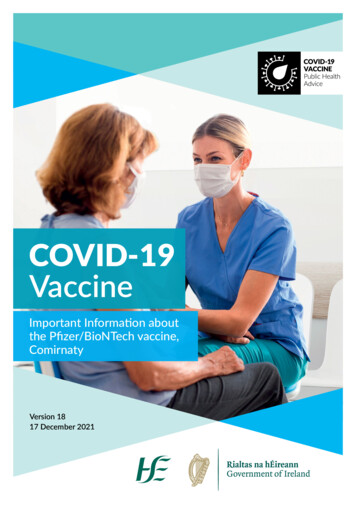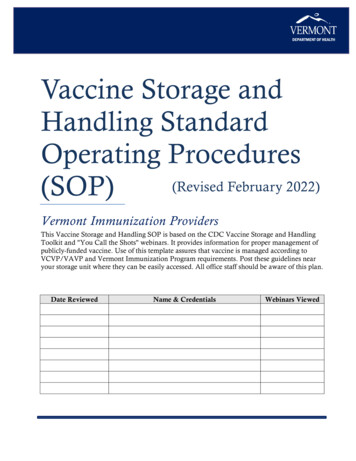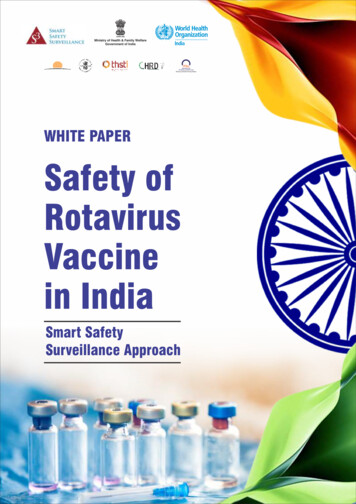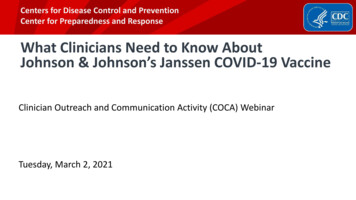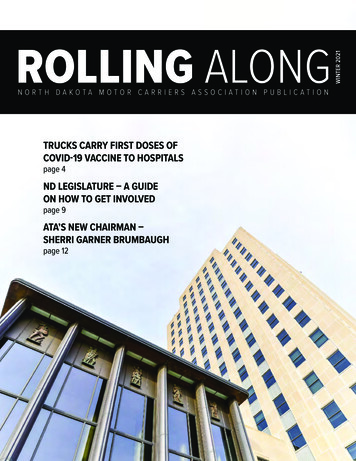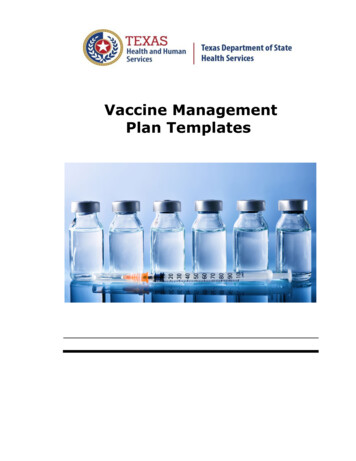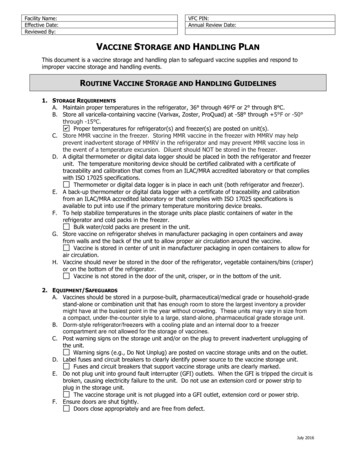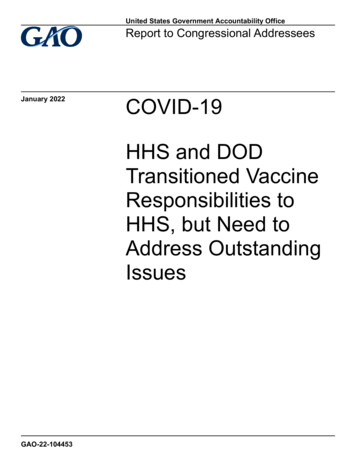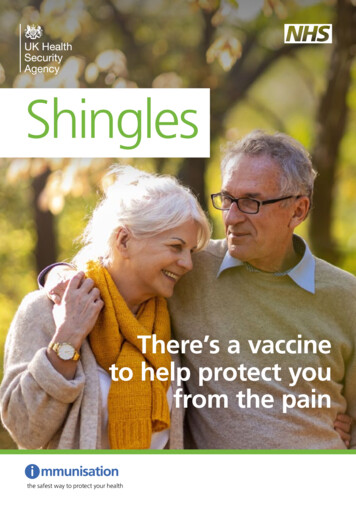
Transcription
ShinglesThere’s a vaccineto help protect youfrom the painthe safest way to protect your health
There is a vaccine that helps reduceyour risk of getting shingles andreduces the severity of symptoms ifyou develop the disease.Shingles is caused by the same virusas chickenpox. Anyone can developshingles because most peoplehave had chickenpox (even if theydon’t remember having it).This leaflet describes shingles and thebenefits of the vaccination and who iseligible for the vaccine this year.This leaflet explains about the Zostavax vaccine.If you have problems with your immune system and cannothave the live Zostavax vaccine you may be eligible for 2 dosesof the Shingrix vaccine.Please see the Shringrix leaflet accine-forpeople-with-weakened-immune-systems2
Shingles isn’t like otherinfectious diseasesbecause you don’tcatch it from someoneelse. Most of us hadchickenpox when wewere young, althoughsome of us will not beaware that we’ve had it.Shingles can be very painful andtends to affect people morecommonly as they get older.And the older you are, theworse it can be. For some, thepain caused by shingles can lastfor many years. Shingles canreally affect your life, stoppingyou from doing all the things youusually enjoy.If you did have it, thenthe virus that caused itcan stay in your bodyfor the rest of your lifewithout you knowingit is there. If the virusreactivates it causes adisease called shingles.Shingles (also known asherpes zoster) is caused by thereactivation of an infection of anerve and the area of skin thatit serves, resulting in clusters ofpainful, itchy, fluid-filled blisters.These blisters can burst and turninto sores that eventually crustover and heal. These blistersusually affect an area on one sideof the body, most commonly thechest but sometimes also thehead, face and eye.What is shingles?3
How long does it lastand how serious canit be?The rash usually appears a fewdays after the initial pain andtingling and lasts forabout a week. Theolder you are, themore likely you areto have long-lastingpain. Sometimesshingles develops inthe eye and may alsoaffect the eyelid.This can cause severe pain andlead to decreased vision or evenpermanent blindness in that eye.Most people recover fully, but forsome, the pain goes on for severalmonths or even years – this is calledpost-herpetic neuralgia (PHN).This is a particularly unpleasantcondition with severe burning,throbbing or stabbing nerve pain.The vaccine reduces the risk ofgetting shingles and PHN. Even ifyou still get shingles, the symptomsmay be much reduced.What causes shingles?Shingles is caused by the samevirus that causes chickenpox – thevaricella zoster virus. When yourecover from chickenpox most ofthe virus is destroyed but somesurvives and lies inactive inthe nervous system. It canthen reactivate later in lifewhen your immune systemis weakened by increasingage, stress or conditions/treatments that reduceyour immunity.How do you catchshingles?You don’t catch shingles.Chickenpox virus caught earlierin your life reactivates later tocause shingles. You can’t catchshingles from someone whohas chickenpox.However, if you have shinglesblisters, the virus in the fluid caninfect someone who has nothad chickenpox and they maydevelop chickenpox.You become eligible for shingles vaccineas you turn 70 years of age and youremain eligible up to 79 years of age.4
How commonis shingles?About 1 in 5 people who have hadchickenpox develop shingles. Thismeans that every year in Englandand Wales, tens of thousandsof people will get shingles. It ismore common in people agedover 70 years, and of these, about14,000 go on to develop PHN andover 1,400 are admitted to hospitalbecause of it.How effective isthe vaccination?By having the vaccination you willsignificantly reduce your chanceof developing shingles. In fact, inthe first 3 years since the vaccinewas introduced there were about17,000 fewer GP consultationsfor shingles. And, if you do go onto have shingles the symptomsare likely to be milder and theillness shorter, than if you hadnot had the vaccination.How and when is thevaccine given?Like most vaccinations, thevaccine will be given in yourupper arm. You will only havethe vaccination once.If you have the Zostavax vaccine,you will just need 1 injection.If you are not eligible for the livevaccine, you will need 2 doses ofthe Shingrix vaccine 2 months apartto give you the best protection.Once your course is completed,you will not need any moreshingles vaccines.Will there be anyside effects?Side effects are usually quite mildand don’t last very long. The mostcommon side effects, which occurin at least 1 in every 10 people,are headache, and redness, pain,swelling, itching, warmth, andbruising at the site of the injection.If the side effects persist for morethan a few days you should discussthis with your GP or practice nurse.How safe is the vaccine –has it been used in othercountries?Like all licensed vaccines,the shingles vaccine has beenthoroughly tested and meets UKand European safety and licensingrequirements. It has been usedextensively in several countriesincluding the United States ofAmerica and Canada.In the first 4 years of the shinglesvaccination programme more than2.3 million people were vaccinatedin England.5
Who will getthe vaccine?Those aged 70 years of age areeligible for the vaccine.The vaccine is also available forthose previously eligible but whomissed immunisation. For example,anyone in their 70s who has notyet had the vaccine.What about people whoare under 70 or over80, will they be gettingthe vaccine?People under 70 years of age areat lower risk of shingles but willbecome eligible for the vaccinewhen they turn 70. People aged80 years and over are not eligiblefor the shingles vaccinationbecause the vaccine becomesless effective as people get older.If you are worried about shinglesspeak to your GP.Do I need to doanything to get thevaccination?Yes, if you are eligible,contact your GP practice tomake an appointment tohave your vaccination.6Are there people whoshouldn’t have thevaccination?There are 2 shingles vaccinesavailable. One contains aweakened version of the liveshingles virus.The live vaccine is the one thatis routinely used in the UK butpeople who have weakenedimmune systems, for exampledue to cancer treatment, shouldnot have it.They should have the inactivatedshingles vaccine. Your doctorwill advise whether this appliesto you. For information on thisvaccine please see the leaflet accinefor-people-with-weakenedimmune-systems.If you’ve had a severe reaction toany of the substances that go intothe vaccine, you shouldn’t have it.Again, your GP will advise you.The live shingles vaccine used inthe UK contains porcine gelatine.Some people may not want thisvaccine but it is the recommendedvaccine unless you cannot haveit because you have a weakenedimmune system.
If you have the Zostavax vaccine,you will just need 1 injection.If you are not eligible for the livevaccine, you will need 2 dosesof the Shingrix vaccine 2 monthsapart to give you the bestprotection. Once your course iscompleted, you will not need anymore shingles vaccines.Can the vaccine giveme shingles?Most people do not get a rashfrom the vaccine but in the rareevent that you do, please seekadvice from your GP practice.Further informationSpeak to your GP or practicenurse, for more informationbefore or after you’ve had thevaccination. You can also visitthe NHS website atwww.nhs.uk/shinglesFor more information about theShingles vaccine Zostavax , visitwww.medicines.org.uk/emc/product/6101/pilFor more information about theShingles vaccine Shingrix efWhat if I miss myvaccination? Can I haveit later?If you missed the shinglesvaccine, you can still have it upto your 80th birthday. Pleasecontact your GP practice tomake an appointment. It’simportant that you do not leave ittoo late to have the vaccination.Remember if you wereeligible for immunisationin previous years of theprogramme and have notbeen vaccinated againstshingles, you remain eligibleuntil your 80th birthday.7
Summary of the disease and the vaccineShinglesThe vaccine is a common disease that cancause long-lasting, severe pain is significantly reducingthe number of cases has been known to causepermanent disability will reduce the severity ofsymptoms in vaccinated peopleif they develop the disease occurs more frequently inthose over 70 years of agewho are also more likely tohave worse symptoms has been used extensivelyin the US and Canada cannot cause shingles inhealthy peopleHaving your routine shingles vaccination is a good wayof looking after your health so that you can get on withenjoying life without the pain of shingles.shinglessupport.org.ukfacialpalsy.org.uk Crown copyright 20212021508SEN 1p 100K NOV 2021 (APS)UK Health Security Agency Gateway number: 2021638First published August 2014. Revised November 2021The text of this document may be reproduced without formal permission or charge for personalor in-house use.To order more copies of this leaflet visit www.healthpublications.gov.ukor phone: 0300 123 1002, Minicom: 0 300 123 1003 (8am to 6pm, Monday to Friday)www.nhs.uk/vaccinations
disease called shingles. Shingles can be very painful and tends to affect people more commonly as they get older. And the older you are, the worse it can be. For some, the pain caused by shingles can last for many years. Shingles can really affect your life, stopping you from doing all the things you usually enjoy. What is shingles?
